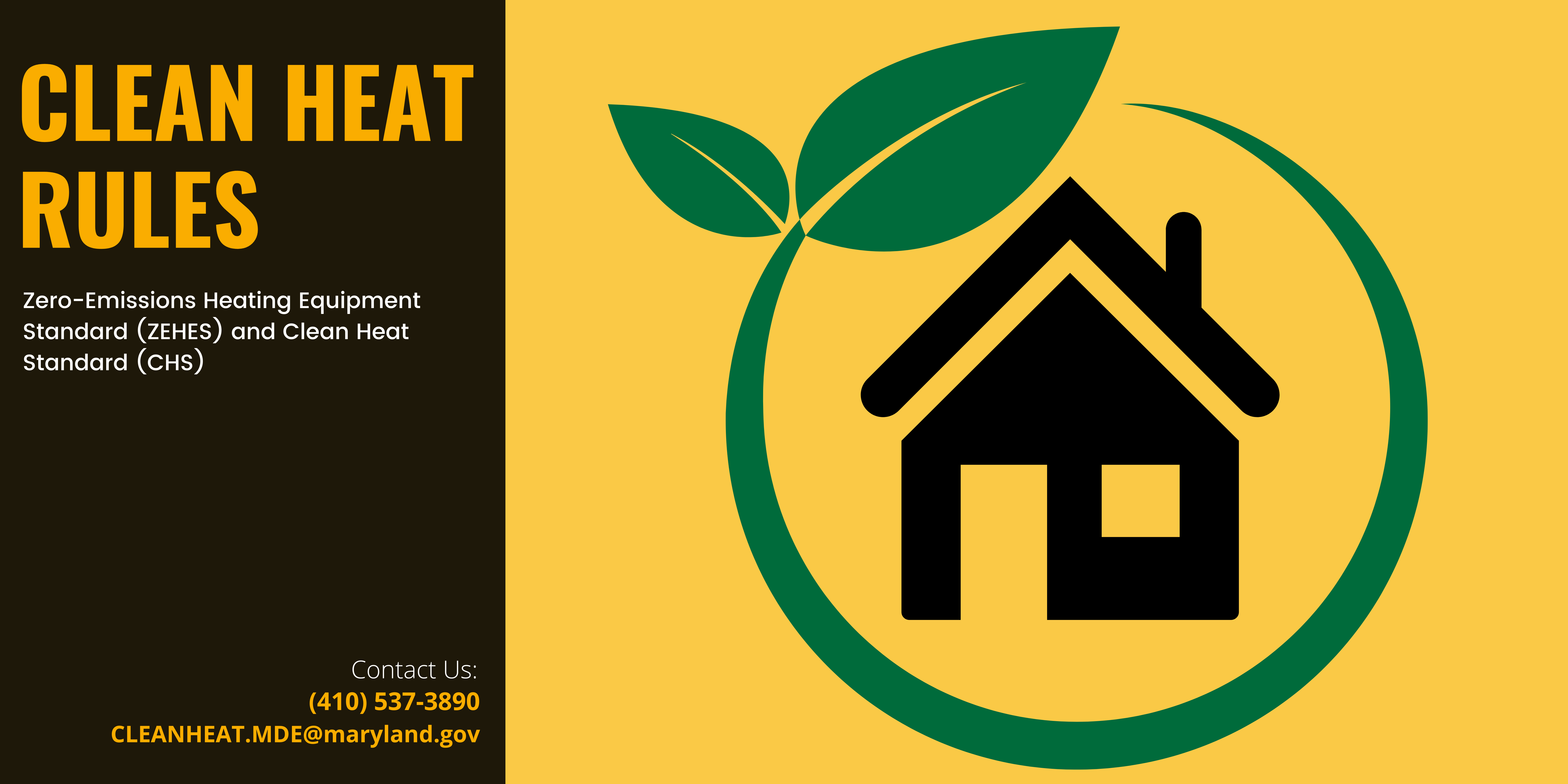
What are the Clean Heat Rules?
Maryland is developing a Clean Heat Standard (CHS) and a Zero-Emissions Heating Equipment Standard (ZEHES) to complement existing programs that reduce air pollution from buildings. CHS and ZEHES together represent the Clean Heat Rules, which will improve public health and lower energy costs for residents and businesses. The Clean Heat Rules will support the transition to efficient heating solutions such as heat pumps. The average Maryland home using heat pumps saves approximately $1,400 annually compared to homes heated with less efficient equipment.
Clean Heat: Lower energy costs and improved air quality. Win-win.
Why is Maryland developing the Clean Heat Rules?
Maryland is among many states working to phase out fossil fuels and transition to a clean energy economy. In 2022, the Maryland General Assembly passed the Climate Solutions Now Act (CSNA), which set new science-based greenhouse gas (GHG) emission reduction requirements to reduce statewide GHG emissions by 60% below 2006 levels by 2031 and achieve net-zero emissions by 2045. In December 2023, the Maryland Department of the Environment (MDE) published a roadmap to accomplish the CSNA goals in Maryland’s Climate Pollution Reduction Plan. Reducing emissions from buildings is a critical part of the state’s Plan.
In June 2024, Governor Wes Moore issued Executive Order 01.01.2024.19, Leadership by State Government: Implementing Maryland’s Climate Pollution Reduction Plan, directing agencies to take action to address climate change. The Executive Order requires MDE to propose CHS and ZEHES to reduce carbon pollution, improve air quality inside homes and the ambient air, and mobilize investment in clean heat solutions for homes and businesses.
Zero-Emissions Heating Equipment Standard (ZEHES)
ZEHES will establish emissions standards for newly manufactured residential-scale furnaces, boilers, and water heaters. Maryland is among several states considering adopting ZEHES under a model rule that will provide consistency throughout the Northeast and Mid-Atlantic regions. ZEHES-compliant equipment, including heat pumps, are widely used across Maryland and have been the best-selling heating systems for the last few years. Federal, state, and utility-sponsored incentives help Maryland households cover equipment and installation costs.
ZEHES will not require the removal of existing heating systems – existing heating equipment can continue to be serviced and maintained. Instead, ZEHES will only apply to new heating systems within certain size limits manufactured after certain compliance dates. Once ZEHES is in effect later this decade, existing buildings will gradually transition to ZEHES-compliant equipment when polluting equipment reaches the end of its life. This will lead to substantial health and economic benefits for all Marylanders. Cooking equipment is not covered by ZEHES.
While ZEHES is an important policy that reduces new sources of pollution from being installed in Maryland, neither ZEHES nor current policies will reduce emissions fast enough and ensure a just and managed transition to achieve Maryland’s climate goals. This is where the Clean Heat Standard comes in.
Clean Heat Standard (CHS)
CHS will guide heating fuel providers - including pipeline gas utility companies and fuel oil/propane delivery companies - to gradually reduce emissions by requiring the delivery of clean heat services to Maryland’s homes and businesses. Clean heat services include installing zero-emissions heating equipment, weatherizing buildings, and delivering cleaner fuels. Companies that deliver clean heat services can earn and monetize credits for their efforts.
Several heating fuel providers in Maryland already deliver clean heat services to their customers. CHS will encourage additional providers to get into the clean heat business.
Heating fuel providers will have a predictable, long-term path to reduce emissions and be incentivized to become clean heat providers. Consumers will benefit from additional incentives for clean heat services but there is no specific requirement for consumers under this program. CHS also ensures benefits to low- and moderate-income Marylanders.
Heating Fuel Provider Reporting Program (HFRP)
Heating fuel providers must submit an annual report detailing the monthly amount of fuel delivered in Maryland, separated by fuel type, sector, and county. Heating fuel providers are to begin collecting fuel delivery data in January 2026. The initial report for calendar year 2026 data will be due by April 1, 2027, with the annual reporting deadline set for April 1st each year thereafter. The annual reporting template will be published in the spring of 2026.
To ensure you receive all program updates and resources, please sign up for MDE's Clean Heat Rules email list and select the “heating fuel provider" checkbox on the second page.
MDE will share essential information on registration for the HFRP, the annual reporting template, and announcements for future work groups focused on program implementation through this email list and the Air Quality Compliance website in the coming months.
See the resources below for more information. If you have any questions, please email us at [email protected] with the subject “HFRP" or give us a call at 410-537-3890.
Learn More about Clean Heat Technologies and Existing Incentives
Learn more here about clean heat technologies, such as heat pumps, that decarbonize buildings, improve air quality, and reduce energy costs.
Resources on the Clean Heat Rules
Stay Connected
Do you have questions about the Clean Heat Rules? Email our Clean Heat Team at [email protected] or call (410) 537-3890. Other resources are available to help guide you:
Sign up for Clean Heat Rules communications